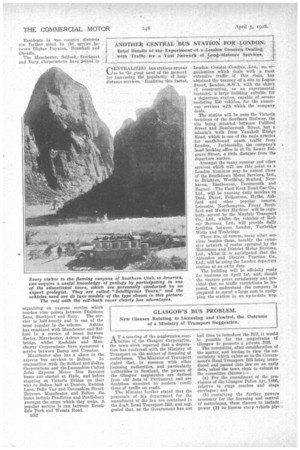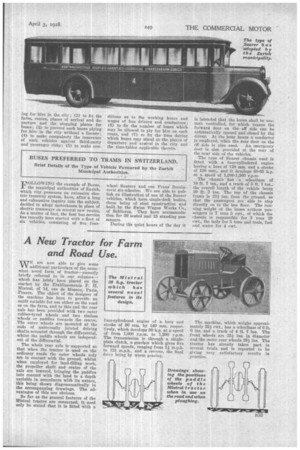GLASGOW'S BUS PROBLEM.
Page 66

Page 67

If you've noticed an error in this article please click here to report it so we can fix it.
New Clauses Relating to Licensing and Control, the Outcome of a Ministry of Transport Suggestion.
AT a meeting of the magistrates committee of the Glasgow Corporation, the town clerk reported that a deputation has conferred with the Ministry of Transport on the subject of licensing of motorbuses. The Minister of Transport stated that, in common with other licensing authorities, and particularly authorities in Scotland, the powers of the Glasgow magistrates are derived from old Acts of Parliament and are doubtless unsuited to modern -conditions of traffic on roads.
The Minister further stated that the proposals of his department for the amendment of the law are contained in the draft Road Transport.Bill, and suggested that, as the Government has not
had time to introduce the Bill, it would be possible for the magistrates of Glasgow to promote a private Bill. The committee, after consideration of the matter, and having in view the uncertainty which exists as to the Government's Road Transport Bill being introduced and passed into law on an early date, asked the town clerk to submit to the committee clauses (a) For the amendment of the provisions of the Glasgow Police Act, 1866, relative to stage coaches and stage carriages ; and
(b) containing the further powers necessary for the licensing and control of motorbuses, these clauses to include power (1) to license every vehicle ply-4:
ing for hire in the city ; (2) to fix the fates, routes, places of arrival and departure and the stopping places for buses ; (a) to prevent such buses plying for hire in the city without a licence ; (4) to make compulsoty the insurance of such vehicles against third-party and passenger risks ; (5) to make con ditions as to the working hours and wages of bus drivers and conductors ; (6) to fix the number of buses which may be allowed to ply for hire on each route, and (7) to fix the time during which buses may stand at the place's of departure and araival in the city and the time-tables applicable thereto.




















































































































